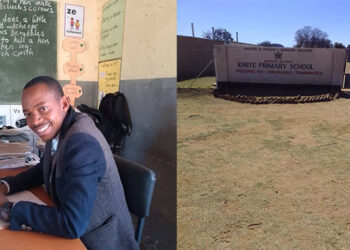Top Stories Today
LATEST NEWS TODAY
The Great Njube Heist: A Tale of Condoms, Cigarettes, and Bread
In a shocking turn of events, a 32-year-old man from Njube, Ishmael Ndlovu, was sentenced to five months in prison...
Read moreDetailsMai Titi’s Latest Drama: Arrest and US$100K Suit Threatened
Comedienne Mai Titi is facing a new legal challenge after businesswoman Shingirai Ziwange Jere threatened to sue her for US$100,000...
Read moreDetailsTeacher Takes Own Life at Kwite Primary School
A quiet morning at Kwite Primary School in Mangwe turned into a scene of horror when a Grade 5 teacher,...
Read moreDetailsZimbabwe’s Rehabilitation Plan Raises Eyebrows
The Zimbabwean government has unveiled a plan to create a private voluntary organization to oversee the rehabilitation of prisoners. The...
Read moreDetailsLady Mo Dies in Car Accident
The Mpumalanga community is mourning the loss of Moses Sibiya, popularly known as Lady Mo, a professional mourner and funeral...
Read moreDetailsThe Natural Order of Things: A Man’s Role in Providing for His Family
As I reflect on the court case between Innocent Ndingani and Memory Mawarire, I am reminded of the timeless wisdom...
Read moreDetailsZimbabwean Journalist Faith Zaba Released on Bail After Power Outage Delays Hearing
Faith Zaba, editor of the Zimbabwe Independent, was granted bail on Friday after a power outage interrupted her bail hearing...
Read moreDetailsThe Unspoken Struggles of Zimbabweans Abroad
The allure of a better life abroad has drawn millions of Zimbabweans to foreign lands, but beneath the surface of...
Read moreDetailsHarare Man Arrested for Attempting to Sell Human Fetus as Beef
A 19-year-old man in Harare, Zimbabwe, has been arrested for allegedly attempting to sell a human fetus as beef to...
Read moreDetailsSables Ready to Rumble: Zimbabwe’s Rugby Team Gears Up for 2025 Rugby Africa Cup
The Zimbabwe national rugby team, affectionately known as the Sables, is set to take the field in the 2025 Rugby...
Read moreDetailsZimbabwe’s Bold Move: Securitizing Diaspora Remittances
The Reserve Bank of Zimbabwe (RBZ) is set to introduce a groundbreaking financial initiative that could unlock over $1 billion...
Read moreDetailsZimbabwe’s Informal Sector: A $7.5 Billion Tax Revenue Opportunity
The African Development Bank (AfDB) has sounded the alarm on Zimbabwe's informal sector, estimating that the country is losing between...
Read moreDetails$4 Million Ecobank Heist: Security Guard Arrested in Major Breakthrough
The Bulawayo police have made a significant arrest in connection with the $4 million Ecobank cash heist that occurred on...
Read moreDetailsThe 3-Minute Marriage: A Tale of Love, Laughter, and Annulment
In a shocking turn of events, a newlywed Kuwaiti couple's marriage was annulled just minutes after the ceremony, making it...
Read moreDetailsNico Williams Commits to Athletic Club with Record-Breaking Deal
In a stunning turn of events, Athletic Club has secured the long-term services of talented winger Nico Williams, signing him...
Read moreDetailsZanu PF’s New Faces: A Step Closer to Power
The wheels are in motion for a new batch of members to join the Zanu PF Central Committee, with prominent...
Read moreDetails

















